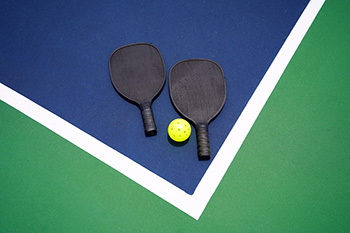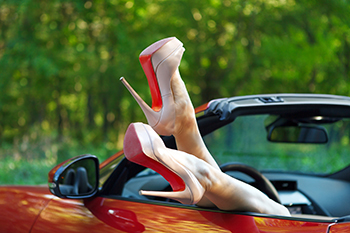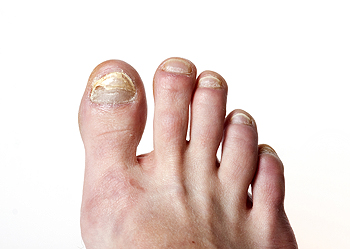Connect With Us
Blog
Items filtered by date: February 2023
Shoes, Socks, and Foot Pain While Playing Pickleball

Pickleball is a sport that requires the right shoes to be worn and may help to prevent foot pain from developing. Many people choose to wear court shoes, which have smooth soles that can help lateral movement. They are designed with a flared bottom that helps increase stability. Court shoes are generally made with extra padding near the laces, providing additional comfort. These shoes may not be the same size as other shoes you own, so it is beneficial to have your feet measured before making a purchase. People who play pickleball know the importance of wearing the right socks and will often change them because of frequent sweating. It can help to take breaks to rest the feet and may help to avoid foot pain. If you would like additional information about how foot pain can be reduced or prevented while playing pickleball, it is suggested that you consult with a podiatrist.
Foot Pain
Foot pain can be extremely painful and debilitating. If you have a foot pain, consult with Tanisha Richmond, DPM from Richmond Foot & Ankle, LLC. Our doctor will assess your condition and provide you with quality foot and ankle treatment.
Causes
Foot pain is a very broad condition that could be caused by one or more ailments. The most common include:
- Bunions
- Hammertoes
- Plantar Fasciitis
- Bone Spurs
- Corns
- Tarsal Tunnel Syndrome
- Ingrown Toenails
- Arthritis (such as Gout, Rheumatoid, and Osteoarthritis)
- Flat Feet
- Injury (from stress fractures, broken toe, foot, ankle, Achilles tendon ruptures, and sprains)
- And more
Diagnosis
To figure out the cause of foot pain, podiatrists utilize several different methods. This can range from simple visual inspections and sensation tests to X-rays and MRI scans. Prior medical history, family medical history, and any recent physical traumatic events will all be taken into consideration for a proper diagnosis.
Treatment
Treatment depends upon the cause of the foot pain. Whether it is resting, staying off the foot, or having surgery; podiatrists have a number of treatment options available for foot pain.
If you have any questions, please feel free to contact our office located in Dayton, OH . We offer the newest diagnostic and treatment technologies for all your foot care needs.
High Heels and Other Questionable Footwear

There’s an old saying: What price beauty? And when it comes to footwear for women, that is the question. Choosing fashion over foot health is common, but in many cases, a high price is paid. The footwear determined to be likely to cause foot, ankle, or toe pain are high heels, flip-flops, stilettos, shoes with pointy toes, and ballet flats. High heels often have pointy toe boxes and stiletto, or thin, heels. This leaves the wearer open to several problems, including pain in the ball of the feet, instability, and sprained ankles. They can also be responsible for bunion pain, corns, hammertoes, and claw toes. Flip-flops offer little to no support for the feet, causing the feet to work harder with each step and expose the heels to cracks and fissures. Because they contain limited cushioning, flip-flops may even contribute to heel pain from plantar fasciitis. Ballet flats rarely have arch support, offering little to no protection from injury, and can lead to knee, hip, and back problems. To learn more about shoes that can promote good health for your feet, please consult a podiatrist.
High heels have a history of causing foot and ankle problems. If you have any concerns about your feet or ankles, contact Tanisha Richmond, DPM from Richmond Foot & Ankle, LLC. Our doctor can provide the care you need to keep you pain-free and on your feet.
Effects of High Heels on the Feet
High heels are popular shoes among women because of their many styles and societal appeal. Despite this, high heels can still cause many health problems if worn too frequently.
Which Parts of My Body Will Be Affected by High Heels?
- Ankle Joints
- Achilles Tendon – May shorten and stiffen with prolonged wear
- Balls of the Feet
- Knees – Heels cause the knees to bend constantly, creating stress on them
- Back – They decrease the spine’s ability to absorb shock, which may lead to back pain. The vertebrae of the lower back may compress.
What Kinds of Foot Problems Can Develop from Wearing High Heels?
- Corns
- Calluses
- Hammertoe
- Bunions
- Morton’s Neuroma
- Plantar Fasciitis
How Can I Still Wear High Heels and Maintain Foot Health?
If you want to wear high heeled shoes, make sure that you are not wearing them every day, as this will help prevent long term physical problems. Try wearing thicker heels as opposed to stilettos to distribute weight more evenly across the feet. Always make sure you are wearing the proper shoes for the right occasion, such as sneakers for exercising. If you walk to work, try carrying your heels with you and changing into them once you arrive at work. Adding inserts to your heels can help cushion your feet and absorb shock. Full foot inserts or metatarsal pads are available.
If you have any questions please feel free to contact our office located in Dayton, OH . We offer the newest diagnostic and treatment technologies for all your foot and ankle needs.
Heel Pain Can Be Treated!
Drinking Water May Help to Prevent Swollen Feet

A common symptom among pregnant women is swollen feet. It may become worse during the warmer months, and can worsen as the pregnancy progresses. This may be a result of changes in the blood chemistry, causing the fluid to shift into the tissues. The blood becomes thicker to accommodate the growing fetus, pooling in the feet, and can cause the feet and ankles to swell. The medical term for swelling is edema, and it may affect one foot more than the other. There are effective methods that can be implemented that can help to prevent swelling. Reducing sodium intake, frequently elevating the feet, and drinking plenty of water can help to manage swollen feet. Research has shown that many women notice swelling has reduced in their feet approximately 24 hours after delivery, and will continue to improve. If you would like additional relief methods from swollen feet and ankles during pregnancy, it is suggested that you confer with a podiatrist who can address any concerns you may have.
Pregnant women with swollen feet can be treated with a variety of different methods that are readily available. For more information about other cures for swollen feet during pregnancy, consult with Tanisha Richmond, DPM from Richmond Foot & Ankle, LLC. Our doctor will attend to all of your foot and ankle needs.
What Foot Problems Can Arise During Pregnancy?
One problem that can occur is overpronation, which occurs when the arch of the foot flattens and tends to roll inward. This can cause pain and discomfort in your heels while you’re walking or even just standing up, trying to support your baby.
Another problem is edema, or swelling in the extremities. This often affects the feet during pregnancy but tends to occur in the later stages.
How Can I Keep My Feet Healthy During Pregnancy?
- Wearing orthotics can provide extra support for the feet and help distribute weight evenly
- Minimize the amount of time spent walking barefoot
- Wear shoes with good arch support
- Wear shoes that allow for good circulation to the feet
- Elevate feet if you experience swelling
- Massage your feet
- Get regular, light exercise, such as walking, to promote blood circulation to the feet
If you have any questions please feel free to contact our office located in Dayton, OH . We offer the newest diagnostic and treatment technologies for all your foot and ankle needs.
Is Your Toenail Fungus Dying?

Simply put, nobody wants to develop a case of toenail fungus. This is because toenail fungus can negatively impact the color, texture, and odor of the toenails. When a patient has a case of toenail fungus, they often want to know what signs they should be looking for that might indicate that the toenail fungus is dying. It is important to remember that just because these signs might be present, this does not mean that a patient should immediately discontinue using any medication that their medical professional provided them. Some of these signs include a decline in the discoloration of the toenail. The toenail might slowly start getting less and less yellow, white, black, or brown. Additionally, another important sign to look for is the diminishing thickness of the toenail. Lastly, a sign that a case of toenail fungus is dying is that a new nail is growing in a healthy state. Contact a podiatrist today if you want to treat your toenail fungus.
For more information about treatment, contact Tanisha Richmond, DPM of Richmond Foot & Ankle, LLC. Our doctor can provide the care you need to keep you pain-free and on your feet.
Toenail Fungus Treatment
Toenail fungus is a condition that affects many people and can be especially hard to get rid of. Fortunately, there are several methods to go about treating and avoiding it.
Antifungals & Deterrence
Oral antifungal medicine has been shown to be effective in many cases. It is important to consult with a podiatrist to determine the proper regiment for you, or potentially explore other options.
Applying foot powder on the feet and shoes helps keep the feet free of moisture and sweat.
Sandals or open toed shoes – Wearing these will allow air movement and help keep feet dry. They also expose your feet to light, which fungus cannot tolerate. Socks with moisture wicking material also help as well.
If you have any questions please feel free to contact our office located in Dayton, OH . We offer the newest diagnostic tools and technology to treat your foot and ankle needs.
Reminder: When Was the Last Time...?
Blog Archives
- May 2025
- April 2025
- March 2025
- February 2025
- January 2025
- December 2024
- November 2024
- October 2024
- September 2024
- August 2024
- July 2024
- June 2024
- May 2024
- April 2024
- March 2024
- February 2024
- January 2024
- December 2023
- November 2023
- October 2023
- September 2023
- August 2023
- July 2023
- June 2023
- May 2023
- April 2023
- March 2023
- February 2023
- January 2023
- December 2022
- November 2022
- October 2022
- September 2022
- August 2022
- July 2022
- June 2022
- May 2022
- April 2022
- March 2022
- February 2022
- January 2022
- December 2021
- November 2021
- October 2021
- September 2021
- August 2021
- July 2021
- June 2021
- May 2021
- April 2021
- March 2021
- February 2021
- January 2021
- December 2020
- November 2020
- October 2020
- September 2020
- August 2020
- July 2020
- June 2020
- May 2020
- April 2020
- March 2020
- February 2020
- January 2020
- December 2019
- November 2019
- October 2019
- September 2019
- August 2019
- July 2019
- June 2019
- May 2019
- April 2019
- March 2019
- February 2019
- January 2019
- December 2018
- November 2018

